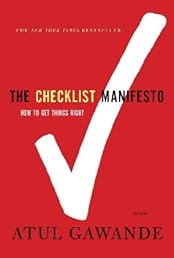
|
The Checklist Manifesto: How to Get Things Right
|
|||||||||||||||||||
Buying Choices |
| 56 new from $8.37 |
| 55 used from $7.61 |
(as of 2012-10-06 20:14:01 PST)
Description
In his latest bestseller, Atul Gawande shows what the simple idea of the checklist reveals about the complexity of our lives and how we can deal with it.
The modern world has given us stupendous know-how. Yet avoidable failures continue to plague us in health care, government, the law, the financial industry—in almost every realm of organized activity. And the reason is simple: the volume and complexity of knowledge today has exceeded our ability as individuals to properly deliver it to people—consistently, correctly, safely. We train longer, specialize more, use ever-advancing technologies, and still we fail. Atul Gawande makes a compelling argument that we can do better, using the simplest of methods: the checklist. In riveting stories, he reveals what checklists can do, what they can’t, and how they could bring about striking improvements in a variety of fields, from medicine and disaster recovery to professions and businesses of all kinds. And the insights are making a difference. Already, a simple surgical checklist from the World Health Organization designed by following the ideas described here has been adopted in more than twenty countries as a standard for care and has been heralded as “the biggest clinical invention in thirty years” (The Independent).
| Check All Offers | Add to Wish List | Customer Reviews |
Editorial Review
Amazon Best Books of the Month, December 2009: With a title like The Checklist Manifesto, it would be natural to expect that Atul Gawande is bent on revolutionizing that most loved-hated activity of workers the world over: the to-do list. But it's not the list itself he wants to change; there are no programmatic steps or tables here to help you reshuffle daily tasks. What you'll find instead is a remarkably liberating and persuasive inquiry into what it takes to work successfully and with a personal sense of satisfaction. The first thing you'll realize is that it takes more than just one person to do a job well. This is a toppling revelation made all the more powerful by Gawande's skillful blend of anecdote and practical wisdom as he profiles his own experience as a surgeon and seeks out a wide range of other professions to show that a team is only as strong as its checklist--by his definition, a way of organizing that empowers people at all levels to put their best knowledge to use, communicate at crucial points, and get things done. Like no other book before it, The Checklist Manifesto is at once a restorative call to action and a welcome voice of reason. --Anne BartholomewAmazon Exclusive: Malcolm Gladwell Reviews The Checklist Manifesto
Malcolm Gladwell was named one of TIME magazine's 100 Most Influential People of 2005. He is most recently the author of What the Dog Saw (a collection of his writing from The New Yorker) as well as the New York Times bestsellers Outliers, The Tipping Point, and Blink. Read his exclusive Amazon guest review of The Checklist Manifesto:

Over the past decade, through his writing in The New Yorker magazine and his books Complications and Better, Atul Gawande has made a name for himself as a writer of exquisitely crafted meditations on the problems and challenges of modern medicine. His latest book, The Checklist Manifesto, begins on familiar ground, with his experiences as a surgeon. But before long it becomes clear that he is really interested in a problem that afflicts virtually every aspect of the modern world--and that is how professionals deal with the increasing complexity of their responsibilities. It has been years since I read a book so powerful and so thought-provoking.
Gawande begins by making a distinction between errors of ignorance (mistakes we make because we don't know enough), and errors of ineptitude (mistakes we made because we don’t make proper use of what we know). Failure in the modern world, he writes, is really about the second of these errors, and he walks us through a series of examples from medicine showing how the routine tasks of surgeons have now become so incredibly complicated that mistakes of one kind or another are virtually inevitable: it's just too easy for an otherwise competent doctor to miss a step, or forget to ask a key question or, in the stress and pressure of the moment, to fail to plan properly for every eventuality. Gawande then visits with pilots and the people who build skyscrapers and comes back with a solution. Experts need checklists--literally--written guides that walk them through the key steps in any complex procedure. In the last section of the book, Gawande shows how his research team has taken this idea, developed a safe surgery checklist, and applied it around the world, with staggering success.
The danger, in a review as short as this, is that it makes Gawande’s book seem narrow in focus or prosaic in its conclusions. It is neither. Gawande is a gorgeous writer and storyteller, and the aims of this book are ambitious. Gawande thinks that the modern world requires us to revisit what we mean by expertise: that experts need help, and that progress depends on experts having the humility to concede that they need help. --Malcolm Gladwell
Book Details | ||||
| Author: Atul Gawande | Publisher: Picador | Binding: Paperback | Language: English | Pages: 240 |
Comments |
Become a fan of Book Presence on Facebook for the inside scoop on latest and most exclusive books.





